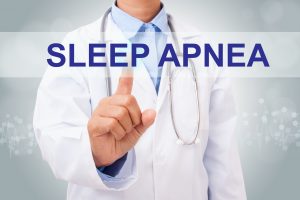 Sleep apnea is a condition that causes frequent breathing disturbances while sleeping. Every time you stop breathing, your body is depleted of oxygen, increasing your risk of various health issues, like heart attacks and strokes. Not to mention, it can affect your quality of life drastically, leading to sleep deprivation, depression, and more. Anyone can develop sleep apnea, but there are several risk factors, like obesity or a large neck circumference. However, researchers have found another link. Genetics can play a role in your risk of sleep apnea, and here’s how.
Sleep apnea is a condition that causes frequent breathing disturbances while sleeping. Every time you stop breathing, your body is depleted of oxygen, increasing your risk of various health issues, like heart attacks and strokes. Not to mention, it can affect your quality of life drastically, leading to sleep deprivation, depression, and more. Anyone can develop sleep apnea, but there are several risk factors, like obesity or a large neck circumference. However, researchers have found another link. Genetics can play a role in your risk of sleep apnea, and here’s how.
Genetics and Sleep Apnea
There are two types of sleep apnea: central sleep apnea and obstructive sleep apnea. Both cause breathing interruptions, but for different reasons. Central sleep apnea occurs when the brain doesn’t send the proper signals to the muscles responsible for breathing. Obstructive sleep apnea is more common. It’s caused by an obstruction in the upper airway. The tongue or muscles in the back of the mouth collapse as they relax. They can create a blockage when sleeping.
Researchers have found a small genetic component to central sleep apnea, however, there’s little evidence supporting a hereditary involvement. Instead, central sleep apnea is more likely to occur from age, gender, previous medical conditions, and opioids.
On the other hand, obstructive sleep apnea has a stronger connection to genetics. Research suggests genetics contribute to about 40% of the risk. The other 60% is attributed to other factors, like lifestyle, health, and environment. Obstructive sleep apnea is associated with being male, large neck, obesity, aging, structural abnormalities, sedatives, or smoking.
Treating Sleep Apnea
You can’t change your genes, but a healthy lifestyle can lower your risk of sleep apnea. If you develop the breathing disorder, it’s best to contact your physician right away. They’ll order a sleep study to confirm a diagnosis and recommend an effective treatment, which may include:
CPAP Machine
A CPAP machine is the most traditional method of treating both central and obstructive sleep apnea. A machine delivers a steady stream of air pressure through a mask worn over the nose to stop depletions of oxygen.
Oral Appliance Therapy
As an alternative to a CPAP, patients with mild-to-moderate obstructive sleep apnea can benefit from an oral appliance. The custom-fit device repositions the tongue or jaw to prevent the soft tissues from blocking the airway. It’s a comfortable, effective solution that can be used along with a CPAP.
Breathe Easier Tonight
You don’t have to toss and turn at night worrying about sleep apnea. Your sleep specialist has the solutions you need to breathe easier, so you can get the rest you need to feel your best.
About Dr. Pamela J. West
Dr. West achieved her dental degree at the University of Southern California Dental School and continued her education to focus on sleep medicine. She is a proud member of various professional organizations, including the American Association of Sleep Medicine and the American Sleep and Breathing Academy. She offers the latest solutions for sleep apnea therapy. Contact our office today to request your consultation.
